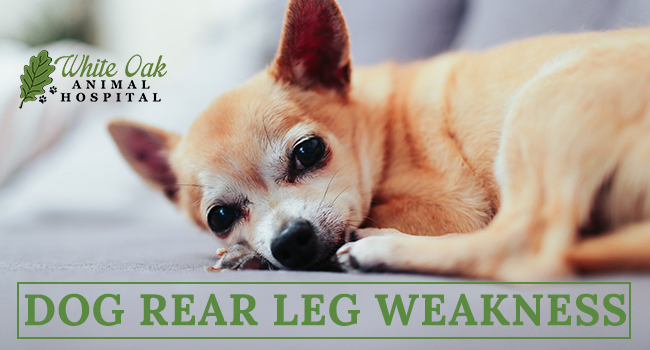
Dog rear leg weakness is an unfortunately common ailment.
Causes can include injury, arthritis, and degenerative myelopathy.
Symptoms may include:
- A swaying gait, with the rear end moving back and forth
- “Bunny hopping”, especially up the stairs
- Difficulty getting up
- Exercise intolerance
- Pain and stiffness in the rear end
- Reluctance to walk, run, climb stairs, jump, or play
- Sitting in a “frog” position with one leg splayed out
Dog Rear Leg Weakness Caused By Degenerative Myelopathy
Degenerative myelopathy affects the back legs.
It causes muscle weakness and loss of coordination.
These symptoms may appear to be arthritis.
Some dogs drag one or both rear paws when they walk.
Dragging can cause their nails to be worn down.
Dog Rear Leg Weakness Caused By Arthritis
Aging or overweight dogs frequently suffer from osteoarthritis.
The common joint disease causes deterioration of joint cartilage, resulting in a loss of lubrication between the joints.
When joints lose lubrication, the body tries to produce more synovial fluid resulting in joint swelling.
When left untreated, joints break down causing small fractures and bone spurs to develop.
The friction and bone spurs cause pain as the joint capsule stretches and rubs against nerves and bone.
Herbal Remedies For Dog Rear Leg Weakness
Some veterinarians recommend remedies such as NSAIDs to treat the pain associated with arthritis.
NSAIDs can have side effects such as stomach issues.
However, natural remedies, such as herbal supplements, typically offer gentler relief.
Supplements combine several herbs to provide a strong positive impact for your pet.
Each ingredient is even stronger when used in conjunction with other herbs and compounds.
Learn more about natural remedies for dog rear leg weakness.
Dong Quai Root
Studies show dong quai root affects hormones in animals.
As pets age, hormones often become unbalanced.
An herbal remedy addressing hormone loss may help alleviate dog rear leg weakness.
Bulrush Pollen
Veterinarians typically prescribe bulrush pollen to help stop bleeding.
This quality is beneficial in treating the inflammation associated with injured hindquarters.
Prepared Corydalis Yanhusuo Tuber
Dog rear leg weakness is often accompanied by pain. Corydalis is a known pain reliever and is also known to increase blood flow.
Chinese Red Peony Root
Peony is thought to block chemicals that cause muscle cramps, alleviating painful or stiff hindquarters.
It also may prevent blood clotting and acts as an antioxidant.
Sichuan Lovage Rhizome
Research suggests the chemicals in lovage might decrease spasms.
Myrrh Resin
Scientists know myrrh kills bacteria and other microbes.
Additionally, myrrh oil contains compounds that interact with opioid receptors. The compounds tell the brain it’s not in pain.
Myrrh can also block the production of inflammatory chemicals, preventing swelling and pain.
Chinese Cinnamon Bark
Oils found in cinnamon bark are believed to reduce spasms and may also increase blood flow.
Fennel Fruit
The aromatic oils in fennel exert smooth muscle antispasmodic properties, alleviating tight hindquarters.
Ginger Rhizome
One study showed people taking ginger for osteoarthritis experienced significant reductions in pain and disability.
Seeking an herbal remedy for dog rear leg weakness?
Try Kan Essentials Dispel Stasis in the Lower Palace, which contains each of these gentle herbs.